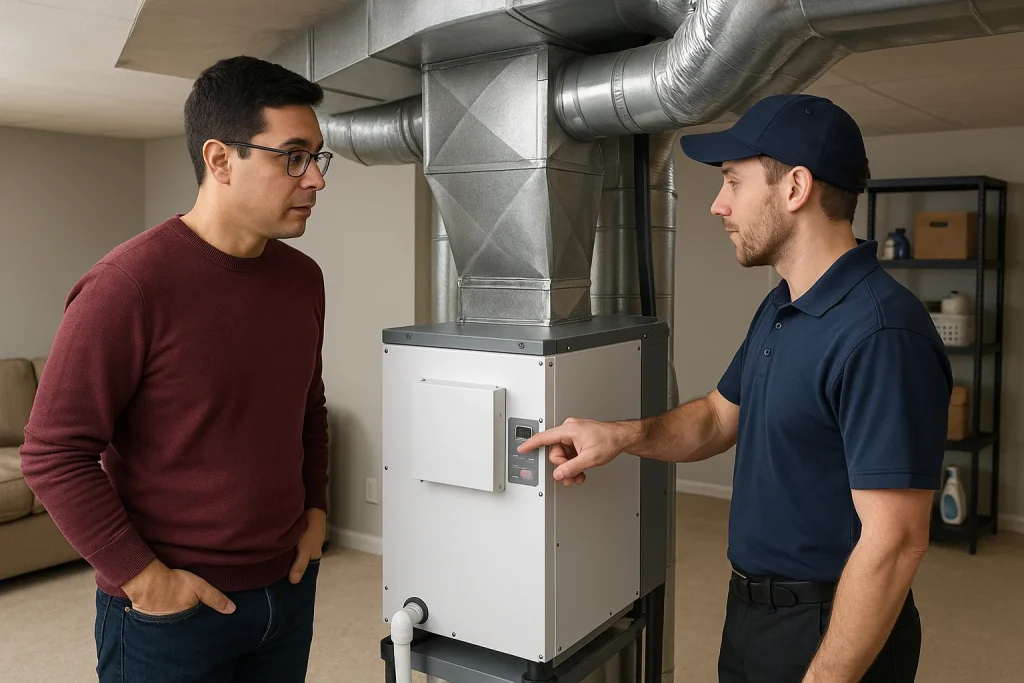Did you know that indoor air can be up to five times more polluted than the air outside? One of the lesser-known culprits behind poor indoor air quality is excess humidity. When humidity levels rise above 50%, your home becomes a breeding ground for mold, dust mites, and bacteria—making the air you breathe uncomfortable and even hazardous.
That’s where a dehumidifier comes in. Whether used as a standalone appliance or integrated with your HVAC system, a dehumidifier can significantly improve the health and comfort of your indoor environment. Let’s explore four key ways it boosts your indoor air quality.

1. Prevents Mold and Mildew Growth
High humidity is mold’s best friend. Bathrooms, basements, and kitchens are common problem areas, but mold can appear anywhere there’s lingering moisture. Mold doesn’t just damage your home—it’s a serious health threat, especially for people with asthma, allergies, or compromised immune systems. When a dehumidifier keeps humidity levels in check, it removes the moisture mold needs to grow and spread.
According to the EPA, nearly 50% of homes have dampness or mold problems, which can lead to respiratory infections and long-term health effects. A dehumidifier acts as a frontline defense against these conditions, making your indoor air cleaner and safer to breathe.
2. Reduces Airborne Allergens
Dust mites and mold spores thrive in moist environments. When you reduce humidity, you also reduce these microscopic allergens that float through your air and trigger sneezing, coughing, itchy eyes, or even asthma attacks. For allergy sufferers, a dehumidifier can be life-changing.
Maintaining a humidity level between 30% and 50% makes your home far less hospitable to allergens. Many modern whole-home dehumidifiers even pair with advanced air filtration systems, offering a one-two punch against pollutants and allergens. If you’ve ever noticed that your allergies improve when you leave home, your indoor humidity could be part of the problem.
3. Improves Overall Air Comfort and Breathability
Humid air feels heavier, stickier, and harder to breathe—especially in warmer months. It can leave you feeling tired or sluggish and even make it more difficult to cool your home efficiently. A dehumidifier lightens the air by removing excess moisture, which makes breathing easier and more comfortable.
In fact, with drier air, your HVAC system doesn’t have to work as hard to cool your space. That means lower energy bills and more consistent indoor comfort. It also eliminates that “clammy” feeling that can linger in humid homes—even when the thermostat says the temperature is just right.
4. Protects Your Home and HVAC System
Humidity isn’t just a problem for your air—it’s also hard on your home. Over time, high moisture levels can warp wood flooring, damage furniture, peel paint, and corrode HVAC components. These issues are expensive to fix and can often be prevented with a reliable dehumidifier.
When connected to your HVAC system, a whole-home dehumidifier helps reduce the strain on your air conditioner by handling moisture removal more efficiently. Your AC runs less frequently, lasts longer, and maintains better airflow. That’s a win-win for your indoor air and your system’s longevity.
Contact Althoff Home Services today to schedule an appointment with our professionals. Chicago’s Choice Since 1961. Hand It Off to Althoff!
